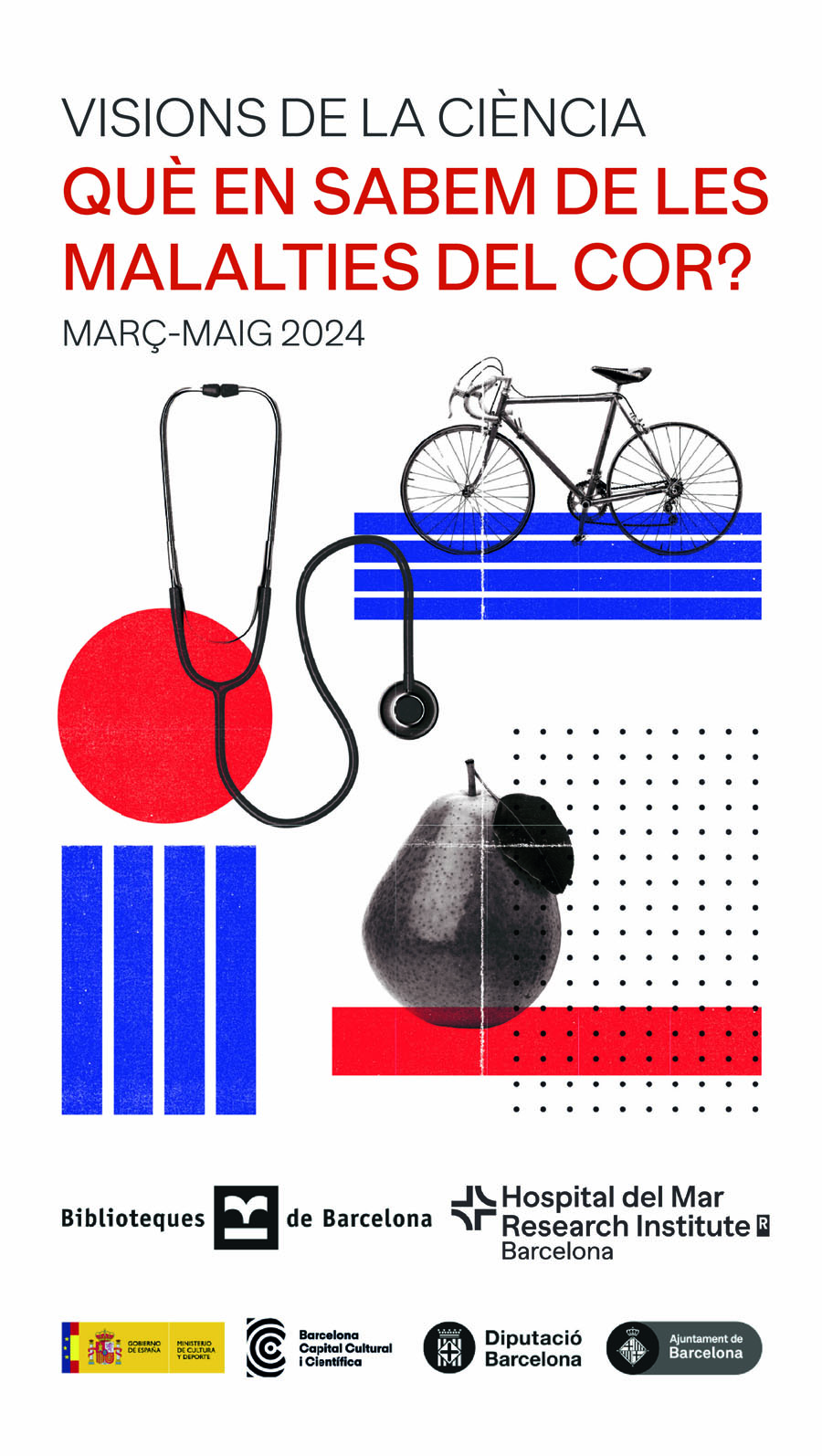
16/02/2024 - Events
In collaboration with the Network of Libraries of Barcelona
From March 4 to May 13, 2024, will take place in different libraries of Barcelona the cycle "What do we know about heart diseases", organized by Hospital del Mar Research Institute and the the Network of Libraries of Barcelona. This is a cycle that is part of the "Visions of Science" project that the Barcelona Libraries have been carrying out for years, and that for the fourth year has been entrusted to the Hospital del Mar Research Institute thanks to the success obtained in previous editions.
The cycle has a duration of 8 weeks. Every Monday at 18:30 h there will be free talks, open to all, on topics related to the heart, a complex and fascinating organ about which we still have a lot to discover.
In this cycle we will learn how our heart works and, in order to make it beat as well as possible, we will learn what the cardiovascular system is, how to take care of our arteries, which are the most frequent heart diseases, what to do to avoid them or how to take care of a woman's heart, among many other topics that will be explained first-hand by professionals from the Cardiology Service of the Hospital del Mar and its research center.
These talks will be held alternatively in 5 libraries in Barcelona: Camp de l'Arpa - Caterina Alber Libraryt, El Clot-Josep Benet Library, Sagrada Familia Library, Vila de Gràcia Library and Xavier Benguerel Library.
With this initiative the institution wants to show its commitment to the promotion of scientific culture by facilitating the access of citizens to knowledge.
Below you can consult the calendar and more information on the 8 talks included in the cycle. Click here to download the complete program. Click here to see the posters of the different sessions. Barcelona libraries website
We look forward to seeing you!
* Talks will be in Catalan or Spanish
4/3/2024, at 6.30 p.m. - El Clot-Josep Benet Library
Do you know which organ is about the size of a fist? Do you know what the vascular system is and how it works? Who is in charge of supplying the body's cells with the oxygen and nutrients they need to live and, at the same time, transporting waste substances so that other organs can eliminate them? How many heart attacks are there in Catalonia every year? Are there more now than before? Why is it as important to prevent as to cure heart disease? What can we do to take care of our heart?
Talk given by:
11/3/2024, at 18.30 h -Biblioteca Camp de l'Arpa - Caterina Albert
80% of heart disease could be prevented with a healthy lifestyle: doing physical exercise and watching your diet, maintaining an adequate weight, quitting smoking, and taking care of your personal wellbeing. This session will explain what atherosclerosis is, one of the most important culprits of heart disease, and how can we prevent it?
Talk given by:
18/3/2024, at 18.30 h - Sagrada Familia Library
The heart needs oxygen for its functioning. When the arrival of blood flow to the heart is reduced or stopped, the cells, which need oxygen to live, can begin to die quickly. We are talking about a heart attack or angina pectoris, how to act?.
Talk given by:
8/4/2024, at 18.30 h - Vila de Gràcia Library
Heart diseases are the first cause of death in Spain and women are the most affected. One of the reasons may be that women present specific cardiovascular risk factors to be assessed, related to hormonal, gynecological, and obstetric factors. How to take care of women's heart?
Talk given by:
15/4/2024, at 18.30 h - Camp de l'Arpa Library - Caterina Albert
In recent years, genetics has been playing an increasingly important role in the progress of medical science, which has made it possible in just a few years to identify numerous genes that cause heart disease. There are people who are more susceptible to heart disease, and the reason may be some genetic alteration. What are these genetic and familial diseases?
Talk given by:
29/4/2024, at 18.30 h - Sagrada Família Library
When the heart has an irregular and often very fast rhythm (arrhythmia) it can cause several complications. During atrial fibrillation, the upper chambers (atria) beat chaotically, irregularly and not synchronized with the lower chambers (ventricles).What to do then?
Talk given by:
6/5/2024, at 18.30 h - El Clot-Josep Benet Library
Ultrasound of the heart or echocardiogram is a fundamental diagnostic test because it provides a moving image of the heart. Using ultrasound, echocardiography provides information on the shape, size, function, strength of the heart, the movement and thickness of the walls and the functioning of the valves.
Talk given by:
13/5/2024, at 18.30 h - Xavier Benguerel Library
Heart failure is a syndrome in which the heart functions incorrectly, either because it does not beat strongly or because it does not relax well, and as a consequence the patients' legs swell, they retain liquids, and they feel suffocated when walking. It is very frequent and one of the first causes of unscheduled hospitalization in Catalonia.
Talk given by:

This cycle, co-organized by the Hospital del Mar Research Institute and the Barcelona Libraries, counts with the collaboration of the CIBER groups CB16/11/00229 (Dr. Jaume Marrugat), CB16/11/00246 (Dr. Roberto Elosua), CB06/03/0028 (Dr. Montserrat Fitó)
Servei de Comunicació:
Marta Calsina(ELIMINAR)
Tel:
(+34) 93 316 06 80
Doctor Aiguader, 88
08226 Barcelona
© Institut Hospital del Mar
d'Investigacions MèdiquesLegal Notice and Privacy Policy | Cookie Policy | Site Index | Accessibility | Find Us | Contact